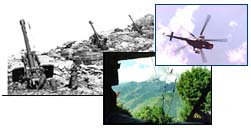
|
HOME |
NEWS |
REDIFF DIARY
|
Chindu Sreedharan |
|
"That's our guns," says Dr Bashir Ahmad, originally from Srinagar. He was posted to this township of around 15,000 as the district chief husbandry officer two years and 10 months ago. The first shelling on the town -- the nearby areas had been receiving strikes earlier too -- came after his arrival.
A few hours earlier, on Tuesday, May 26, we had arrived in Kargil at around 1730 hours, ending a hazardous eight-and-a-half hour journey from Srinagar through shell-hit areas. At Drass, we had entered the battle zone. A fact that was driven home by the rows of artillery lined up facing Pakistan.
And, of course, that deep rumble, that rolling clap of thunder.
Shelling was still continuing along the route. The deserted Drass, which incidentally is the second coldest inhabited place in the world, for instance, had been hit again. Casualties, however, were not confirmed. At Chaukyal, we had come across a whole village migrating.
''Kargil
Hence we drove into Kargil expecting to see a ghost town. And were pleasantly surprised to see people around. If Drass looked shell-struck, Kargil appeared quiet and peaceful. There were over a dozen people on the road. A few shops were open in the main market, and you could even see a few civilian vehicles.
Yet, about an hour earlier there had been shelling here.
Now we were discussing the situation with Dr Ahmad. "When a shell explodes this side," he was saying, "the sound is much greater." A few hours later, we were to experience Pak shells, when at around 0330 hours artillery opened up and the crash and boom grew louder on the hills around us.
But now, sitting cross-legged on the floor, with the clap of thunder continuing in the background, Dr Ahmad, this veteran of four major shelling and numerous smaller ones, is giving us a firsthand version of what happened the day before. It was the heaviest shelling I have seen. It was more intense than even last year's in which 20 people were killed. There was a shell coming this way every fifteen minutes. Luckily, experience has taught the people to live with shelling, and we had only one casualty this time. The first few shells came at around 1130 hours. I was in my office then. I immediately rushed home with my colleague. Our office is a dangerous place during such times as it is on the second floor. Usually there's a gap after a shell lands. I utilised that to get home. My clerks and the others who worked with me had all rushed out. For the next hour we remained indoors. When the intensity of shelling increased by around 1230, we took shelter in the corridor behind. There was some respite by around 1400 hours. The shelling was intermittent and continued that way till 1700. Everyone kept in-doors till then. Luckily, no shells landed in the residential area where we were. But the Khurbatang plateau (some 4 km outside the town) and Beru (in the town) were hit. A couple of shells landed in Beru, which houses the offices of the district magistrate and police superintendent. See, shelling keeps on happening around here. But since April 1997 when Kargil was first hit, the town has become very dangerous. You can't tell when the shells will come or where they will land. Our only protection here (the residential area situated where the town begins on the Srinagar side) is that there's no precedence. No shells have landed here yet. Most of the people have fled to other villages. They now come in the morning to open their shops and then go back in the night. You say this is a beautiful village. It is. But everything can change in a minute. Along with some other government offices, we had shifted ours also to Beru on May 1. But when the ammunition dump near Beru was hit and the area came under increased fire, we shifted back on May 9 Luckily for me, I have been transferred out from Kargil. I feel so relieved! I am waiting for my replacement. He will arrive today or tomorrow... Chindu Sreedharan spent an eventful 60 hours in Kargil.
|
||
|
HOME |
NEWS |
BUSINESS |
SPORTS |
MOVIES |
CHAT |
INFOTECH |
TRAVEL |
SINGLES BOOK SHOP | MUSIC SHOP | GIFT SHOP | HOTEL RESERVATIONS | WORLD CUP 99 EDUCATION | PERSONAL HOMEPAGES | FREE EMAIL | FEEDBACK |
||
